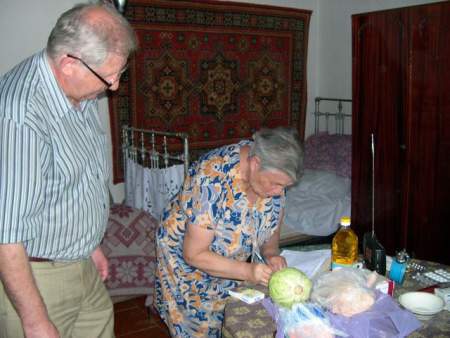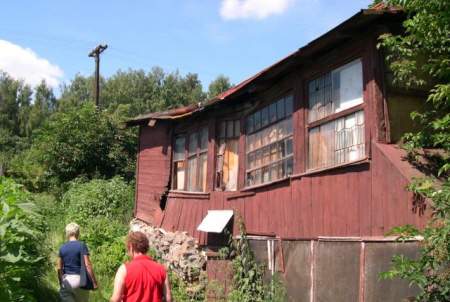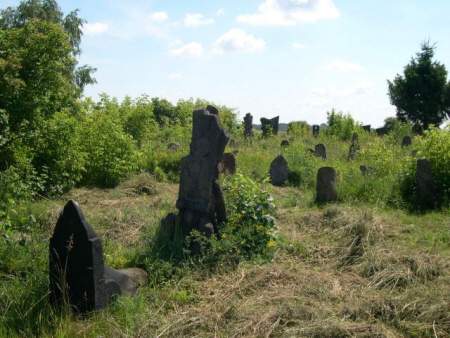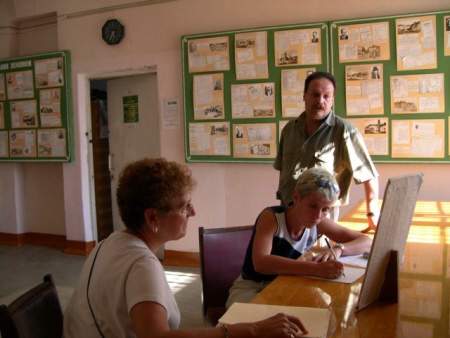Journey to Chudnov
By Mel Chudnof
Related to: Chudnov (Town),
copyright 2005
Volhynia Gubernia
Background
My father always told me that he was born in “Russia”—and technically that is true. It was the Czar’s Russia and yet it was also Ukraine, the largest part of the “The Pale of the Pale of Settlements”, which at different times was Polish, or Austrian or Hungarian. Eighty percent of American Jews have their roots in this part of the world.
Growing up, I heard a lot of stories about the heroic and horrific childhood my father spent in “Russia”, and for me, an avid traveler, I always had wanted to “return” to that mystical place, when the time was right. Since the fall of the Soviet Union, in 1991, travel to the small shtetels has become easier. Ukraine has become more modern and more traveler friendly. The year 2005 became the time that we could finally make the journey. As a child, listening to the somewhat edited stories of my father and my grandmother and even my friend’s grandparents, I sometimes disbelieved. It all sounded too different from the American world where I was living, too impossible.
My father, Sidney, (born in 1912) not only told me there was a town with our family name, where all his family was born, but that the word Chudnov itself meant exceptional or wonderful. Sounded like his typical joking. Dad told how his father, Tevya, left for America first to find a job in 1913. (a common phenomenon). Unfortunately, by the time he called for his wife and children to join him, it was too late for Sarah and her two young sons to get out. They were stuck in the larger city of Zhitomir for five years where they had to endure the violence and depravity of World War One, the Russian Revolution, and the continued pogroms. (1914-1919).
My father told of soldiers and gangs of Bolsheviks shooting up the town, about hiding in the basement for days, about suffering from night-blindness due to malnutrition, about scourging for potato peels, just to survive. My father, “Shulke” and his brother Hershel, 18 months older, would resort to calling strangers, “dirty Jew” in order to protect their own identities. They talked about running from a band of frightening renegades and being lost in the woods for several days, hiding in a barn, and fortunately being returned by a sympathetic farmer to their terrified mother. As grandpa, my father once again mesmerized my own children by talking about how he and his family finally were able to gather enough money and connections, through HAIS, to be hid in a hay wagon and escape across the border to Poland, then Germany, where they spent another two years trying to find the resources to get visas and passage to America. He shared his memories of Ellis Island and how terrified his mother was that they would be sent back because of a minor health problem, the dreaded eye disease.
|
The Chudnof Family
This is a composite picture - Sarah Chudnof and her sons Shulke [Sidney] and Herschel[Harold] taken in the Ukraine in 1914, with Tevya Chudnof, husband and father, who was added to this picture after their reunion in the United States in 1921. |
The mysticism and wonder of these stories always called to me. Turning 60 years old must have been the impetus that I needed to finally resolve this yearning. In July of 2005, my wife Nena and I visited the village of Chudnov and the regional capital, Zhitomir and saw the same horse drawn hay wagons that my father had talked of. We met with elderly Jews who described the joys and also the troubles of their long lives, which seem such a contrast to this beautiful little village. We found the old Jewish Cemetery and we were able to trace documents from the Archives in Zhitomir that verified and outlined my father’s family tree back to my great, great grandfather. Every goal, every dream was fulfilled. Not only did we gather a lot of information, but the result was emotionally cathartic in a way I never imagined.
How we arranged the journey and the search
For several months before the trip, I worked with the Jewish Genealogical Society, Jewish Gen and their travel agency called Shtetlshleppers (a one-agent marvel, Joanna Fletcher). Joanna has multiple contacts in the FSU (Former Soviet Union) who specialize in Jewish touring and genealogical explorations. She also held our hand while we worked through all of the details of our multifaceted trip and through all the anxiety. For the Chudnov mission, she arranged for a guide (with driver), Gelena Yankovich,a young Jewish woman with the chutzpah and sechel to plan, push, search, and network, ahead of time and on the spot, to find what a family may be seeking. Her strategy, this time was that she arranged for us meet with the director of the Regional Hesed (The JDC sponsored, Jewish welfare and renewal agency) in Zhitomir.
On our arrival there, we met with Sofia in the crumbling old synagogue building for two hours while Gelena cleverly charmed (or manipulated) the initially reluctant Sofia into helping us. After thirty minutes, Sofia started using her intercom to call in a steady stream of Hesed staff members who volunteered to set up personal experiences that would help us find our roots (and at the same time would familiarize us with the work of their Hesed). It was a pleasure watching Gelena (and Sofia) work. Sofia warmed up even more after I donated 300 Grevnas ($60.US) to her Sedaka box. She made sure that I squeezed the three large bills into the tiny slot of the box.
When we left the Hesed, we were set up to tour the town of Chudnov the next day, accompanying Sasha, the caseworker, while he made his rounds to the homebound elderly, to deliver food packages and medicines. This arrangement gave us the opportunity to visit Chudnov with someone who really knew the town, and we would gain access to meeting several elderly, long time residents of the community. It was a very clever plan.
 |
The Hesed in Chudnov |
Experiencing Chudnov - the place and the people
As we drove and walked around Chudnov (and Zhitomir) I tried to imagine what the area looked like 90 years ago when my father lived here. Where did some of these stories play out? The experience was becoming as emotionally stimulating as it was intellectual. What did it look like before the roads were paved (some were still dirt), what did it look like before these modern buildings were sprinkled among the historic sites? The terrain is rolling hills surrounded by farmland, fields filled with wild poppies and clover. There is a beautiful pond created by a small dam in the winding river in the center of town. There are many single family homes in town, some very old on tiny dirt roads.We visited four citizens of Chudnov.
Two visits allowed us to spend time intensively interviewing and photographing our hosts. Delivering the Hesed food basket with one chicken, one cabbage, one bag of carrots, plus our addition of bananas and juice, we made our first visit to Reva, an 85-year-old widow who lives alone in a 120-year-old home that she says was built or owned by a family named Chudnovsky. She has lived there in this sagging, rural home for almost 60 years herself. She did not remember their first names, but told a lengthy story about two of the Chudnovsky brothers and what happened to them during and after the war.
I’m not sure her story is credible, but I was so excited about sitting in a home that possibly could have been built or owned by some members of my family that I failed to ask as many questions as I could have. I wanted to relish the wrinkles on this woman’s face, the angle of the warped doors that would no longer close, the slant of the floor, the green of the potato plants in her garden, the smell of the rural air.
 |
A home in Chudnov and maybe a home built by the Chudnof family |
Our next visit was with a delightful couple whose family names were Vinavar (The origin of the name Weiner) and Sochritz. He had escaped the Holocaust by allowing himself to be drafted into the Soviet Army and she had fled to Tashkent. She had been a librarian for 40 years and one wall of their very meager home was lined with books, and sprinkled with old family photos and drawings of Lenin and Einstein. Mrs. Vinovar, in particular, was an ardent communist and proudly showed us her latest issue of the communist paper. We asked about the family, Chudnovsky and they tried looking in the small local directory, but found no current Chudnovskys. The Hesed worker had a serious conversation with them about converting to gas heat. They insist on continuing to use their wood burning stove for their winter heat because they are afraid of gas. Their daughter, who was visiting from Russia, said they would never leave this home that they had lived in since for 55 years. It seems that most of the younger Jews of the village have moved on to bigger places.
Networking being Galena’s specialty, she asked the Sochritz’ daughter, Miriam, if she knew where to the find the town’s Jewish Cemetery. She joined us in the car as we drove out of town to a rural road lined with several obviously Christian cemeteries. She wasn’t sure exactly where it was located and I held my breath as Sasha, our guide tenaciously stopped and asked questions of several pedestrians, walking their single cows on a leashes. We found the old cemetery, far back from the road, partially hidden by a farm house. We were surprised to find most of the stones standing, having been designed with an extended granite footing for stability. Most were surrounded by tall grasses. There was a path mowed to the general area, but nothing more. None of the old stones were readable, unfortunately, having been worn by the weather. There were a few newer stones (from the 50’s and 60’s), some with pictures, in the rear, surrounded by individual fences. The rear of the cemetery flowed into a field of wild poppies, purple clover, and yellow grasses. Even though I could not read any stones, this was a very significant experience for me, knowing that I was walking on the burial grounds, no doubt, of my great grand parents and other family members.
 |
The Jewish cemetery in Chudnov |
Sasha, the Hesed worker, then led us to the sight of the mass grave of the holocaust victims of Chudnov. The sight was a like a small Baba Yar, a ravine, partially filled with the bodies of up to 4000 Jews who were shot on this site. There were two small memorials marking this site. The park like setting, ironically, was on the edge of the beautiful large pond which is the center piece of the village. I felt compelled to spend more time here and walked down the back side of the ravine to the pond. There were teenagers enjoying the beach and a beautiful view to the other side of town. This was another special moment in our visit to Chudnov. I found an empty plastic bottle and gathered some earth to bring back with me so that I could share with my children, siblings, and cousins a grain of their family roots. Several months after returning to the U.S., I paid a visit to my father’s and grandparent’s graves and sprinkled some of this Ukrainian earth near their stones and let them know that they were now reconnected with their homeland.
Searching the archives in Zhitomir - the wonderful success of finding our family records
I had emailed Galena before we arrived in Ukraine and had told her that visiting the archives in Zhitomir was a priority for us and we would like to find our family records if possible. I had documents from home that indicated my grandparent’s birthdates and wedding date. The first day we arrived in Zhitomir after checking into the very spartan, Soviet-style “best” tourist hotel, Galena leads us directly to the Regional Archive building. This very imposing ten story building felt like it came directly from a James Bond movie.
We went up two flights of stairs and through two checkpoints where Galina had to do some fast talking. We were admitted to a huge room that was empty except for one table and one light hanging above it. There were 5 or 6 metal doors in the room. These doors were being constantly locked and unlocked as several woman carrying large document books went in and out of what appeared to be the “inner chambers” of the archives. Galena spoke fast and furious Russian to every person she seemed to see. She was convincing them to allow us to put in a request for a family search. Finally, Galena filled out a form and submitted it. As we walked out she said she was very doubtful that we would find anything.
 |
The Archives in Zhitomir
Applying for a search at the Zhitomir Archives with our Ukrainian Guide arranged by JewishGen, Galena Yankovich. |
Two days later, after visiting Chudnov, we reappeared at the Archives and went through the same two checkpoints. This time we were escorted to a small library room and were told exactly where to sit. Two women appeared and the first one started told us (through Galena) that there were no records of our family having lived in Zhitomir. This meant that they did not pay taxes, own property, or vote in the city. The second woman looked like a “cat that swallowed a canary”. She walked up to our table with a huge record book (about 12” by 18” and 8”) thick. She told us that this was the record of the “Society of Chudnov”, dated 1903 and she opened up the book to two full pages that outlines our family tree back to my great-great grandfather, Gershon Chudnovsky. The last entry was my Grandparent’s wedding in 1909.
|
The book at the Zhitomir archives which had my grandparent's mariage record, a family tree, and so much more. I'm with the researcher who found the book. |
I was jumping out of my skin with excitement. Here was the verification of all that I had been told. All of our rich heritage was validated before my eyes. We paid twenty-three dollars for an official photo copy which is signed and sealed by the archive official. I was so happy that I slipped the archive worker another 100 grevenas (twenty dollars) for her personal help in finding these invaluable records. This finding was the culmination of an amazing, life-changing journey to connect with my roots and my soul.
The trip was a life-changing experience.